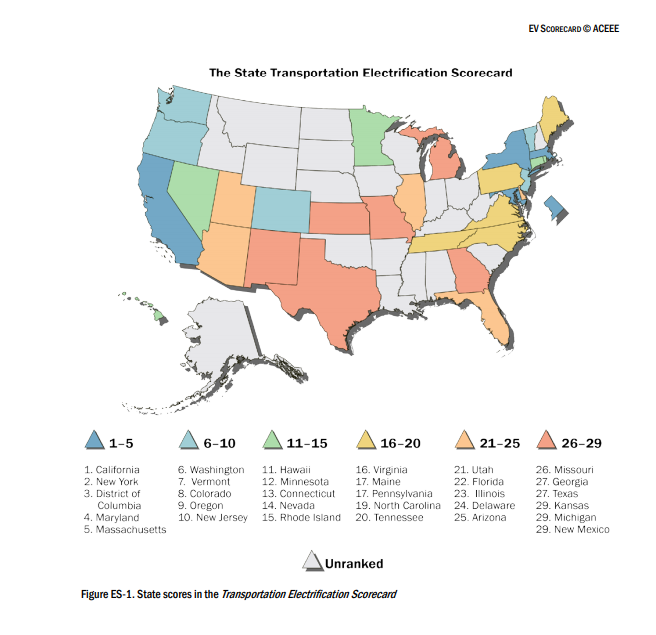
PROVIDENCE – When it comes to policies, programs and financial backing to get electric vehicles on the streets, Rhode Island fares better than most states but still has work to be done.
Rhode Island ranked No. 15 in the country in a new by-state scorecard on electric vehicles published by the American Council for an Energy-Efficient Economy on Wednesday.
The State Transportation Electrification Scorecard used a 100-point system divided into six categories: government-led actions and targets for transportation electrification; incentives (financial and other) to spur electric vehicle purchases and chargers; policies for related transportation system infrastructure; electricity grid optimization; emphasis on equity of eclectic vehicle access to low income and environmental justice communities; and metrics to track or evaluate progress.
The scorecard did not include ranks for states beyond the top 30, because those that fell below this threshold did not receive more than 15% of total possible points, the organization said.
While Rhode Island was not considered a “standout” in any single evaluation category, the report highlighted its executive branch as the “clear leader on state transportation electrification” thanks to its role in the Transportation and Climate Initiative Program and other multi-state agreements with zero-emissions vehicle goals.
Rhode Island and Hawaii were also the only two states to receive a perfect score on their mitigation efforts specifically for Volkswagens, based upon a 2017 settlement agreement between the company and states to use $2.9 billion to replace diesel-related nitrogen oxide from applicable vehicles with cleaner alternatives.
As of 2019 Census data, Rhode Island had 1,08 light-duty electric vehicles registered in the state, equal to one for every 102 residents based on its 2019 population. There were no heavy-duty electric vehicles registered in the state at that time, not including the nine electric vehicle transit buses through the R.I. Public Transit Authority.
The new ranking comes on the heels of a state report evaluating how the state can reduce greenhouse gas emissions, including through electric vehicles which will play a key role in cutting down the estimated 36% of emissions generated by the transportation sector.
The report also offered recommendations for states to help accelerate the market for electric vehicles and reduce greenhouse gas emissions, including set targets for greenhouse gas emission reductions, electric vehicles and energy efficiency; offering “on the hood” incentives to offset the cost of electric vehicles for buyers; and allowing utilities to implement set electric vehicle rates or managed charging programs that integrate these vehicles into the grid.
Neighboring Massachusetts was ranked fifth by the scorecard, with special note of its incentives for electric vehicle purchases and charging infrastructure.
Nancy Lavin is a PBN staff writer. You may reach her at Lavin@PBN.com












